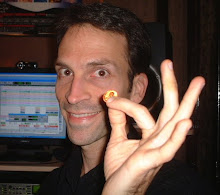Okay, so the big consumption party ended in 2008 and now we're all ready to tighten our belts and get serious about saving, right? But where to begin? The whole concept of investing seems pretty alien and intimidating to most musicians and ordinary folks. I've already addressed some basic investing principles in last year's blog entries, but now I'd like to offer some advice on how to go about choosing your own specific investments.
You don't need a degree in finance to invest wisely and successfully over the long run. It may be wise to hire a financial planner, at least to help you get started, so next week I will discuss choosing your financial advisor. Everybody's individual situation is different, so getting an expert's opinion on your personal situation can be very helpful.
For starters, though, it's pretty safe to offer a couple of generalizations for beginning investors. First of all, I want to stress the importance of establishing an emergency account before embarking on longer-term investment plans. The recent volatility in employment and throughout the economy makes me appreciate my own money market emergency account more than ever. Without some cash to fall back on, it can be very scary to keep working as a musician in tough economic times.
Once your basic emergency account is established and funded, where should you invest next? Very often, experts recommend that you take advantage of any available tax deferred retirement plans before investing elsewhere. If you are a young, single musician, retirement might not seem like the most urgent financial goal to be worried about. But then again, if you plan on being self-employed for life, who do you think is going to be planning your retirement for you? If you live in America, you might be counting on Social Security. Personally, I hope that Social Security will still be around when I reach retirement age, but I'm certainly not counting on it. And even if the system remains in good shape, Social Security checks really don't amount to a livable income, so you'd better start saving for yourself.
Fortunately, in the U.S., there are numerous types of retirement savings accounts available with excellent tax advantages. These include Individual Retirement Accounts (IRAs), Roth IRAs, Simplified Employer Pension (SEP) IRAs, and 401k plans, among others. Basically, all of these accounts are somewhat similar to traditional pension plans, but are held as individual accounts, instead of being pooled together among many company employees, as in traditional pension plans. Since musicians are generally self-employed, the pension option isn't usually available (unless you qualify for the musician's union pension plan), so these other alternatives are available to us. It can be tricky to sort out the differences between these different account types, but they all have some things in common:
1. Money in these accounts grows without being taxed until you take it out at retirement, and in some cases, you can also deduct the amount of your annual contributions on your tax return. That is a potential double tax benefit, which might not seem like a big deal, but in fact it can have a dramatic compounding effect on your ultimate payout.
2. Your contributions are subject to some limited annual amount, which varies depending on your income and the type of account. This is why it's so important to start saving early in these accounts, because you may not be able to make up the difference later through bigger contributions.
3. Most of the money in these accounts may not be taken out until retirement age without paying a significant penalty, with a few exceptions for things like catastrophic medical expenses. This may seem like a disadvantage, but it actually forces you to preserve your own retirement savings.
4. Money in any of these accounts can usually be transferred ("rolled over") to another retirement account without penalty, as long as you follow proper procedures for the transfer. So, for example, if you quit working at a company with a 401k plan, you may be able to transfer your 401k account into a personal Roth IRA account.
For self-employed musicians, I particularly recommend checking into Roth IRAs and SEP IRAs. To determine the best account type for you, start by reading this introduction to the different account types. Next time, we'll discuss choosing a financial advisor to help you through the process.
Subscribe to:
Post Comments (Atom)






1 comment:
Find a financial advisor who is right for your specific needs. There is an unbiased search tool at www.claroconnect.com to match you to financial advisors who specialize in doctors, business owners, musicians!, divorced women and many other specialties.
Post a Comment